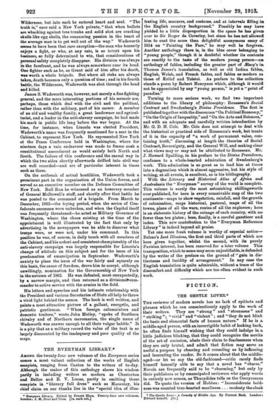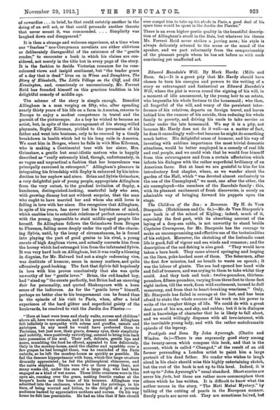FICTION.
THE GENTLE LOVER* THE reviewer of modern novels has no lack of epithets and phrases which he can conscientiously apply to the work of their writers. They are " strong " and " strenuous " and " striking "; " vivid" and "violent" ; and "they do not blink the basic and elemental facts of human nature." If he is a middle-aged person, with an incorrigible habit of looking back, he often finds himself wishing that they could indulge in a. little judicious blinking, that they could recognize the merits of the art of omission, abate their claim to fearlessness when they are only brutal, and admit that fiction may serve as useful a purpose by cheering and consoling as by inflaming and lacerating the reader. So it comes about that the middle- aged—or let us say the old-fashioned—critic rarely finds himself honestly able to say that a novel has " charm." Novels are frequently said to be "charming," but only by their publishers or by emancipated reviewers who apply words in entirely new senses, as Thucydidea tells us the Corcyraeans dill. To quote the version of Hobbes : " Inconsiderate bold- ness was counted true-hearted manliness .. . modesty the cloak
* The Gentle Lamer: a Comedy of Middle Age, By Forrest Reid. London: Edward Arnold. [Ga.]
of cowardice .. . in brief, he that could outstrip another in the doing of an evil act, or that could persuade another thereto that never meant it, was commended. . . . Simplicity was laughed down and disappeared."
It is then a strange and welcome experience, at a time when our " fearless " neo-Corcyraean novelists are either oblivious or deliberately disregardful of the existence of the " gentle reader," to encounter a book in which his claims are con- sidered, not merely in the title but in every page of the story.
It is the fashion to deride Victorian romance for its rose- coloured views and insipid sentiment, but "the tender grace of a day that is dead" lives on in Wives and Daughters, The Story of Elisabeth, The Little Village on the Cliff, and Old Kensington, and, consciously or unconsciously, Mr. Forrest Reid has founded himself on this gracious tradition in his delightful comedy of middle age.
The scheme of the story is simple enough. Benedict Allingham is a man verging on fifty, who, after spending nearly thirty years of his life on a farm in America, returns to Europe to enjoy a modest competence in travel and the pursuit of the picturesque. As a boy he wished to become an artist, but, in spite of the encouragement of his strong-willed playmate, Sophy Kilronan, yielded to the persuasion of his father and went into business, only to be rescued by a timely breakdown in health which led to his long exile in America. We meet him in Bruges, where he falls in with Miss Kilronan, who is making a Continental tour with her sister, Mrs. Grimshaw, a gentle but semi-idiotic matron who is happily described as "really extremely kind, though, unfortunately, in so vague and unpractical a fashion that her benevolence was principally exercised in retrospect." Allingham's pleasure in integrating his friendship with Sophy is enhanced by his intro- duction to her nephew and niece. Brian and Sylvie Grimshaw, a very delightful pair of young people, appropriate Allingham from the very outset, to the gradual irritation of Sophy, a handsome, distinguished-looking, masterful lady who sees, with growing dismay but not without surprise, that the man who ought to have married her and whom she still loves is falling in love with her niece. She recognizes that Allingham, in spite of his years, has never lost his boyishness of mind, which enables him to establish relations of perfect camaraderie with the young, impossible to staid middle-aged people like herself. So Allingham follows the Grimshaws from Bruges to Florence, falling more deeply under the spell of the charm- ing Sylvie, until, by the irony of circumstances, he is forced into playing the part of good genius to his rival, a young curate of high Anglican views, and actually converts him from the heresy which had estranged him from the infatuated Sylvie. It was very hard luck on Allingham, but it was really a blessing in disguise, for Mr. Halyard had not a single redeeming vice, was destitute of humour, mean in money matters, and quite offensively good-looking. The fact that Sylvie fell hopelessly in love with him proves conclusively that she was quite unworthy of her " gentle lover." Brian, the red-headed boy, had " sized up " the curate perfectly, but Brian had an unerring flair for personality, and quoted Shakespeare with a keen sense of the ludicrous. As for the "gentle lover" himself, perhaps no better clue to his temperament can be found than in the episode of his visit to Paris, when, after a brief experience of the hard glitter and superficial gaiety of the boulevards, he resolved to visit the Jardin des Plantes :—
" Here at least were trees and shady walks, nurses and children above all, here were animals, and in his present mood Allingham felt infinitely in sympathy with zebras and giraffes, camels and antelopes. In any mood he would have preferred them to Parisians, but just now, their grave, dreamy eyes, their simplicity and nobility, were positively revivifying, seemed to bring him back into possession of his soul. Their soft, delicate, gentle lips and noses, mumbling the food he offered, appealed to him deliciously. Only in the monkey-house, amid the chatter and squabble over a few grapes he had brought there, was he reminded of the Paris outside, so he left the monkey-house as quickly as possible. He fed the demure hippopotamus with buns, which this large creature dreamily appreciated ; he fed the philosophical rhinoceros, and the naïve elephant. There were two or three young lions, not many weeks old, under the care of a largo dog, who had been engaged as a kind of wet nurse. These little creatures were in the open air, running over the grass, making frantic rushes at the keeper's boots and the hems of his trousers. Allingham was admitted into the enclosure, where he had the privilege, in his turn, of being worried and bitten, to the delight of a juvenile audience backed by appreciative mothers and nurses. On his way home he felt leas pessimistic. He had an idea that if fate should
ever compel him to take up his abode in Paris, a good deal of his spare time would be spent in the Jardin des Plantes."
There is an even higher poetic quality in the beautiful descrip- tion of Allingham's stroll in the Bois, but whatever his theme Mr. Forrest Reid never strikes a jarring note ; his style is always delicately attuned to the scene or the mood of the speaker, and we part reluctantly from the companionship of the pleasant people whom he has set before us with such convincing yet unaffected art.



















































 Previous page
Previous page